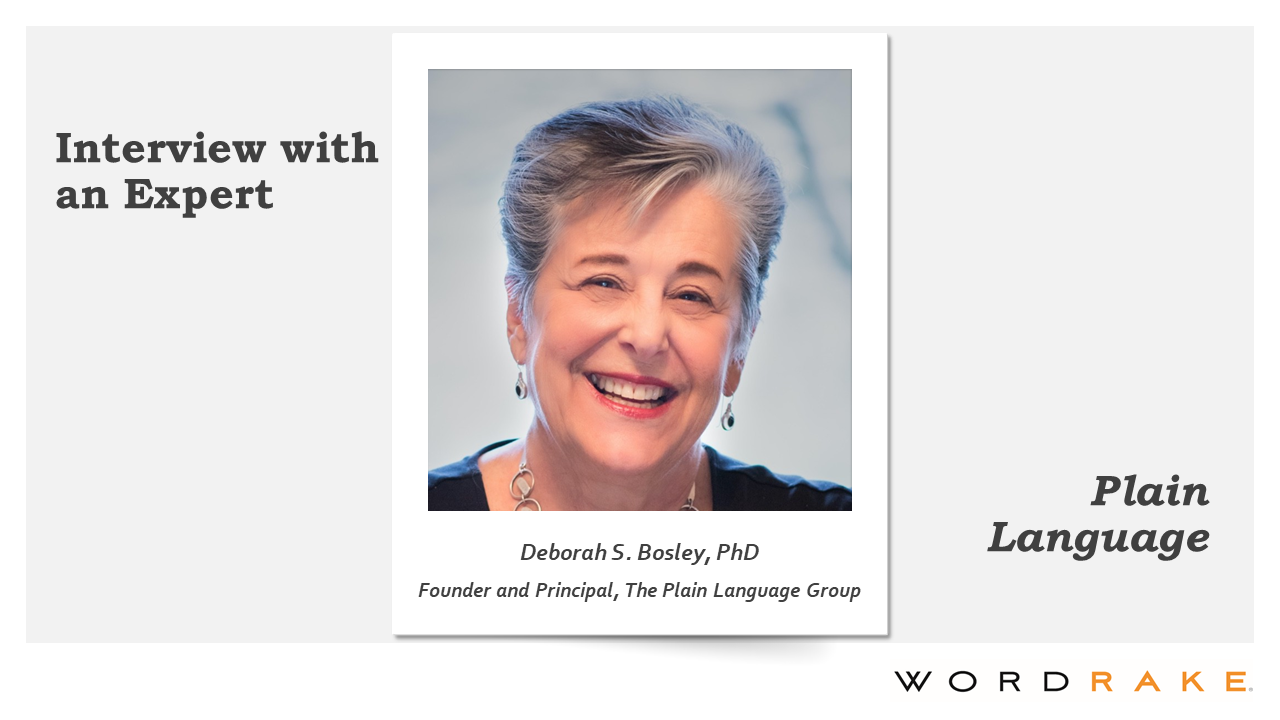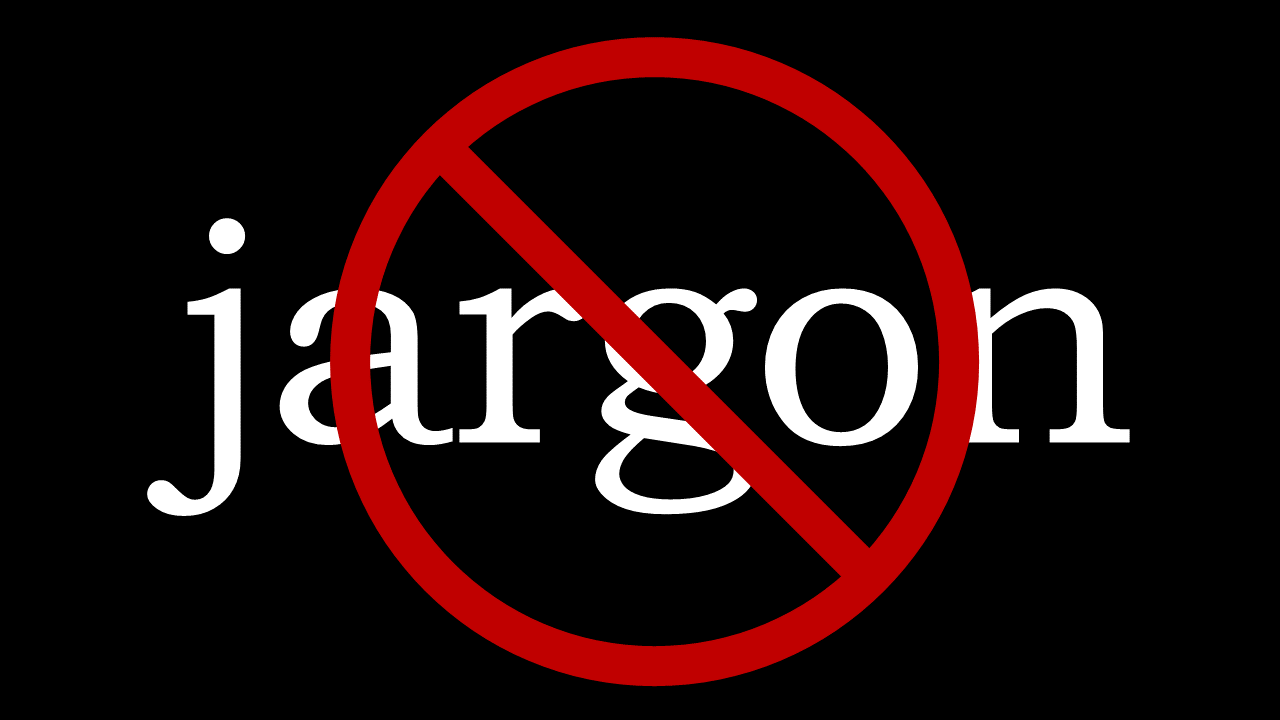Using plain language makes good business sense—and plain language expert Deborah S. Bosley, PhD has dedicated her work to helping corporations and government entities communicate clearly.
In this straight-forward interview, Deborah makes a clear case for plain language in business and civic life and she challenges all professionals to take responsibility for public understanding. Read on as Deborah explains the ethical imperative to write in a manner that’s easy for the public to understand and offers insight on clear communication.
What is your role and how is it connected to plain language?
I am the Founder and Principal at The Plain Language Group. TPLG works primarily with Fortune 100/500 clients in financial, technology, and health. We also work in the legal sector and with government entities. In all cases, we work with our clients to revise complex information into content that is easy to understand and use. TPLG also helps public companies meet regulatory requirements for plain language while increasing profits, trust, and positive customer experiences. We also provide training, usability testing, and expert witness testimony.
What prompted your interest in plain language?
I was a tenured professor of Technical and Professional Writing at UNC Charlotte, so my background prepared me to make a shift from academia to starting my own plain language company. I think I was born to be an entrepreneur. My first introduction to plain language occurred at a Society for Technical Communication conference. Once I discovered the field of plain language, I jumped in with both feet. Ironically, after a few years of working in plain language, I became literally incapable of writing dense, erudite, and complicated academic articles, unless I was asked to be an expert witness and write an expert report.
What is the difference between plain language and plain English?
Essentially, they mean the same, but plain language has a more international scope because most countries are not English-speaking countries—at least English is not their first language.
How are readability and plain language related?
Content written in plain language must be readable and understandable. However, if you’re asking about readability testing, many researchers (Ginny Redish, Karen Schriver, to name a couple) have shown that readability tests do not give us the information they are purported to give. Grade level has very little meaning as it is currently assessed. I admit I do use readability tests just to show a prospective client that their content may be too complex for easy reading. However, I advocate much more for usability testing rather than relying on readability tests.
What are some factors that indicate a need to write in plain language?
Customer complaints, call-ins because clients couldn’t understand content, loss of time and money associated with the call center, and—frankly—regulations that require its use.
How does plain language impact access to justice?
An informed citizenry can only exist if they understand voting materials (ballots, bonds, amendments, etc.), jury instructions, and any other material related to helping citizens understand how to interact with local and state governments and the federal government.
Many professions (i.e., law, medicine, finance) are gatekeepers of important information for the public. What obligations do professionals have to communicate in plain language?
I believe all sectors have an ethical obligation to write materials intended for the public in a manner that’s easy to understand. Anything less increases distrust, could lead to lawsuits, and hinders people from exercising their rights.
Where will consumers commonly encounter the most confusing language?
Almost anything written by an attorney: privacy policies, credit card terms and conditions, mortgages, and contracts, for example. Corporate attorneys write to avoid liability and manage risk. Customers read for understanding. The two often are incompatible.
What’s the biggest danger to consumers if they don’t understand what is being communicated to them?
Death and financial ruin. Seriously. If patients don’t understand what or how to take medication or the processes to undertake at home after being released from the hospital, the results could be fatal. If investors don’t understand financial investments and content, they could make decisions that lead to bankruptcy. The responsibility for creating plain language health and financial information falls on the shoulders of health and financial institutions. It is not patients’ or investors’ responsibilities to try to figure out what content means. This is one reason I don’t like the terms “health or financial literacy.” In both cases, the focus is on the consumer to learn how to understand health and financial information, but the problem arises from the complexity of the information they are expected to understand. Financial and health literacy begins with the company producing the content.
Beyond writing with simpler words and shorter sentences, what else can professionals do to communicate better for the public’s benefit?
- Use common words.
- Be helpful and empathetic.
- Avoid jargon (or define it).
- Organize according to what readers want.
- Tell readers what they need to know, not what you want to tell them.
- Use formatting that makes it easy for readers to find what they’re looking for.
- Understand that design and visuals are the first thing readers notice—make content look easy to read.
- Test content with members of the intended audience.
What’s one piece of advice that you would offer to help a professional start using plain language?
Think about how you feel when you try to read a report, proposal, website, email, terms and conditions, or any other content that is dense, complex, and filled with jargon you don’t understand. That’s how your customers feel. Keep that in mind as you write anything. Plain language will increase trust, loyalty, and show that your company cares about them.
What’s the most convincing statistic that you can share to convince professionals to start using plain language?
- $3.1 Billion: Writing and content deficiencies cost American firms as much as $3.1 billion annually.
- 40%: Poor communications account for as much as 40% of the cost for managing business transactions.
- $26,041: Communication barriers cost businesses and organizations $26,041 per worker in annual productivity losses.
About Deborah S. Bosley, Ph.D.
Deborah S. Bosley, Ph.D., is the Founder and Principal of The Plain Language Group, LLC and Professor Emeritus in English at UNC Charlotte. For the past twenty years, she has worked primarily in financial, health, technology, government, and higher education sectors to create written information that meets regulatory requirements while being easy for customers to understand. Using proven writing and design strategies, training tools, and research results, she helps organizations achieve critical goals. Her clients include JPMorgan Chase, Bank of America, Wells Fargo, USBank, Google, eBay, and Abbott Labs, the University of California Office of the President, and Cigna, among others.
Deborah also has written for, or been interviewed by The Atlantic, Time Magazine, ThriveGlobal, Employee Benefit News, Investment News, The Federal Reserve, The Wall Street Journal This Weekend radio broadcast, HealthLeader Media, Entrepreneur, other print and social media. Deborah has published three books and dozens of articles about clear communication. and has given hundreds of presentations to organizations in the U.S., France, England, Germany, Ireland, Mexico, Sweden, and others.
Plain Language and Clear Communication Interview Series
This interview is part of a series produced in connection with WordRake’s support for the Access for All: Plain Language is a Civil Right conference. WordRake is editing software for sophisticated writers who must communicate clearly. It improves writing by simplifying and clarifying text, cutting jargon, and recommending plain English replacements. WordRake runs in Microsoft Word and Outlook, and its suggestions appear in the familiar track-changes style. You decide when to run WordRake and which edits to accept, so you get quality and speed without sacrificing control. Editing for clarity and brevity has never been easier. Try WordRake for free for 7 days.






